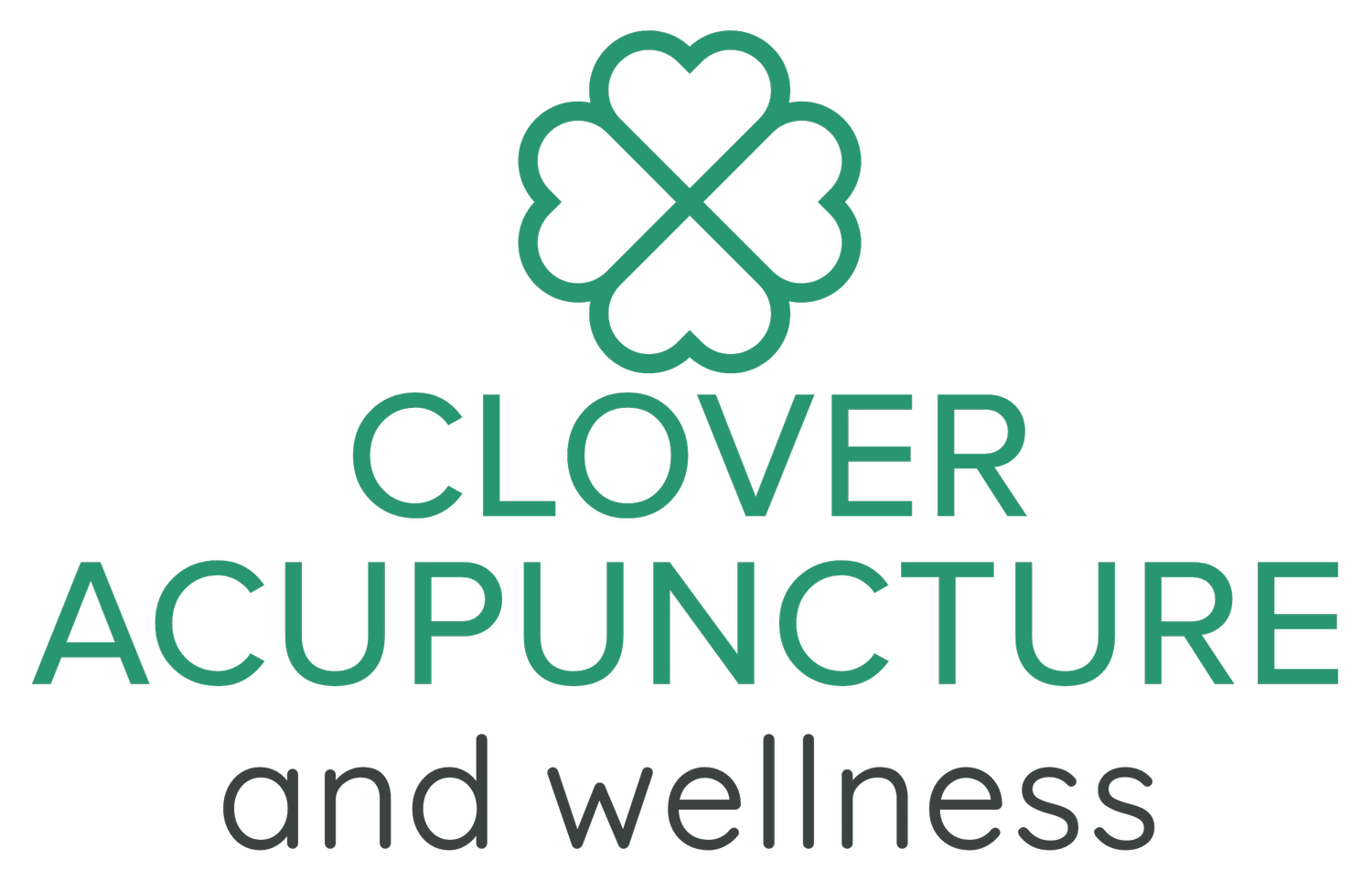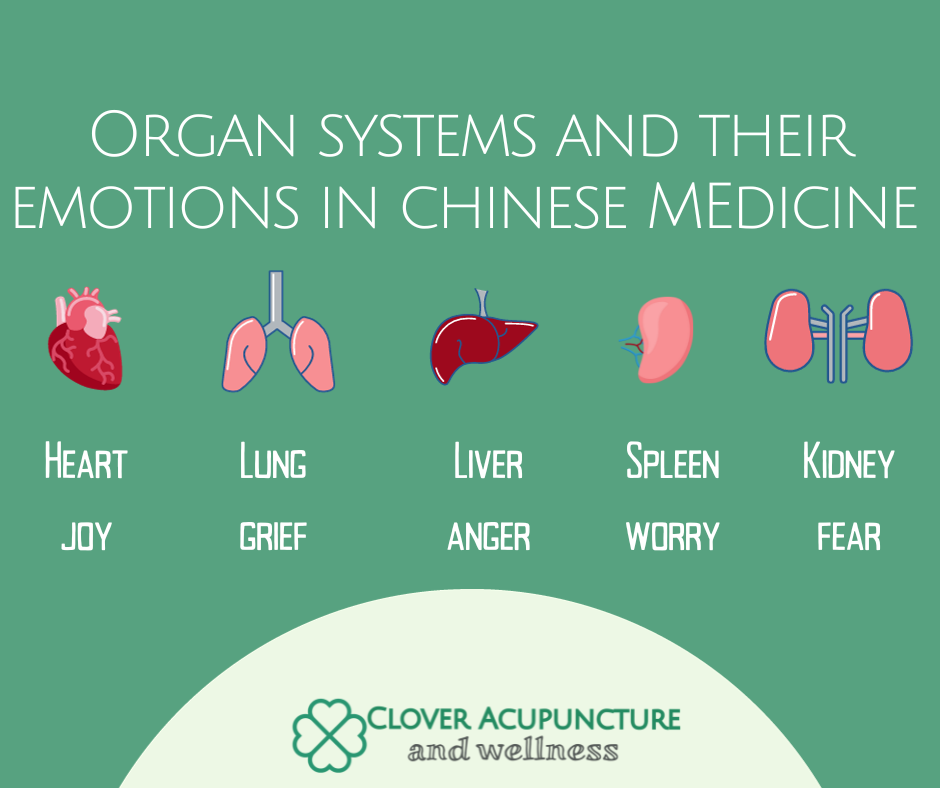The Emotional and Physical Health Connection
At Clover Acupuncture, mental health is a top priority when it comes to treating our patients. There are multiple approaches within Traditional Chinese Medicine (TCM) when addressing issues related to mental health. And there is rarely a physical symptom that is not, at least in part, related to, or worsened by a particular emotion.
In the ideal mental health scenario, our emotions flow freely, are acknowledged, responded to appropriately, and thus, processed. However, if the emotional stimuli are too sudden, too strong/excessive, last a long time, or are suppressed, we may become “stuck” in our emotions. This disturbs the mental/physical balance in the body and creates blockages which in turn can result in physical dis-ease or ailments.
In Chinese Medicine, each emotion is linked to a specific organ meridian pair. All organ meridians are associated with different aspects of the non-physical body. Keep in mind that references to organs here pertain to the energetic organs, their meridians or pathways, and relative functions under TCM theory, and not the actual organs themselves.
“Various pains often show up on the body along certain meridians which are linked to an unbalanced emotional state. If we treat both the emotion and the pain, we can expect a better, lasting result.”
-Candice Behan, Acupuncturist at Clover Acupuncture & Wellness
Fear - Kidneys (Yin organ), Urinary Bladder (Yang organ)
Fear and fright causes the Kidney Qi (life force) to descend, and because the Kidney governs the lower orifices, temporary loss of urinary control may occur. A state of constant fear will weaken bladder function in general, may affect hearing-the sensory outlet of the kidney channel, or stagnate in the lower back or other kidney meridian dominated area, causing pain.
Anger - Liver (Yin organ), Gallbladder (Yang organ)
Anger causes the Liver’s energy to rise to the head, resulting in headaches, high blood pressure, redness in the face, or dizziness. When Liver Qi is unable to flow smoothly, one may experience irritability, depression, over-reactions to even small stressors, and sudden outbursts of rage.
Joy - Heart (Yin organ), Small Intestine (Yang organ)
In excess, joy can scatter the Heart Qi and disturb the Shen (or mind in TCM). Excess joy manifests as agitation, mania, or over-excitement and may cause heart palpitations, repeated agitation, poor concentration, anxiety, and insomnia.
Worry - Spleen (Yin organ), Stomach (Yang organ)
The spleen is associated with worry or pensiveness and overthinking. Excessive thinking, rumination and studying can cause injury to the spleen, which may result in lethargy, fatigue, and digestive issues due to its connection to the stomach channel.
Grief - Lung (Yin organ), Large Intestine (Yang organ)
The lung is associated with grief, sorrow, melancholy, and loneliness. Grief will stagnate in the chest, and weaken the function of both heart and lung, ultimately causing weakness of qi and blood throughout the body. Unresolved or suppressed grief can have a very intense and harmful effect on the physical body. Grief can get stuck in areas which pertain to the lung meridian such as the lungs, breasts, colon, and throat.
“In practice, I have seen grief to be the most damaging of all emotions. It is vital to acknowledge one's grief and let episodes of sadness wax and wane naturally.”
-Candice Behan, Acupuncturist at Clover Acupuncture & Wellness
Balancing Mental Health Recommendations
Paying attention to how you feel, and responding to it takes practice, but it is one of the most worthwhile things you can do for your overall health.
Here are some options to shift the focus and improve mood that you can do at home:
Extended exhale: Take 2 minutes doing this easy breath work to make a really big impact! You will simply double your exhalation time compared to your inhalation. For example, breathe slowly for 4 seconds, then slowly exhale for 8 seconds. During the 4-second inhalation phase, breathe in through your nose—as you relax the back of your eyes and visualize filling up your lower diaphragm with oxygen—and slowly count to four. Then, exhale through pursed lips (as if you're blowing out lots of candles on a birthday cake) as you slowly count to eight.
Longer exhales cause the vagus nerve to send a signal to your brain, activating the parasympathetic nervous system (rest and digest) and easing the sympathetic nervous system (fight, flight, or freeze).
Essential Oils: Diffuse oils in your home or work space that help to uplift the spirit! Or rub them onto your palms or back of the neck for a topical option. Citrus scents (lemon or orange) are mood boosters, or try an aromatic, like eucalyptus or peppermint if you are feeling depressed. If anxious, lean on oils that have a more calming and grounding effect, such as lavender, cedarwood, or frankincense.
Acupressure: tapping on certain acupressure points can also be helpful. My favorite one to recommend is located on the sternum or the breast bone, at the center of the chest, in line with the nipples. This point is known as Ren-17. Any mental or emotional disturbances will have a direct correlation and effect on the Heart, so tapping or gently massaging this point can help ease the mind as well as the Heart. Gently pinching along the ear is a great way to bring some mental calm. Using your thumb and index fingers you can slowly massage your lobes and tug at them gently. As you massage, try to take a moment to relax the shoulders as well as the muscles of the face and jaw.
Better Sleep: Poor or insufficient sleep has been found to increase negative emotional responses to stressors and to decrease positive emotions. Sleep is important to a number of brain and body functions engaged in processing daily events and regulating emotions and behaviors. Also, we heal when we sleep and if not allowing ourselves to properly rest, we are prolonging a state of dis-ease. Read more about how to cultivate better sleep.
Sleep deprivation studies show that otherwise healthy people can experience increased anxiety and distress levels following poor sleep.
Acupuncture Makes a Big Difference
Taking care of our emotional wellbeing is crucial to staying healthy. Fortunately, Chinese Medicine can offer a clear path to peace and wellness again. When visiting a TCM practitioner, be prepared to discuss your emotional health. An effective course of acupuncture will depend on an assessment of both your physical and emotional wellbeing.
TCM also offers herbal medicine formulas which help the many different ways in which emotions can disrupt the balance of health. A top formula which is often chosen is Xiao Yao Wan. You can read more about this wonderful herbal blend here. At Clover Acupuncture & Wellness, along with your acupuncture treatment, Candice can make herbal recommendations specific to your individual needs and concerns.
by Candice Behan Lic.Ac.
#AcupunctureMentalHealth #AcupunctureForAnxiety #AcupunctureForSleep #AcupunctureforPain #AcupunctureBackPain


